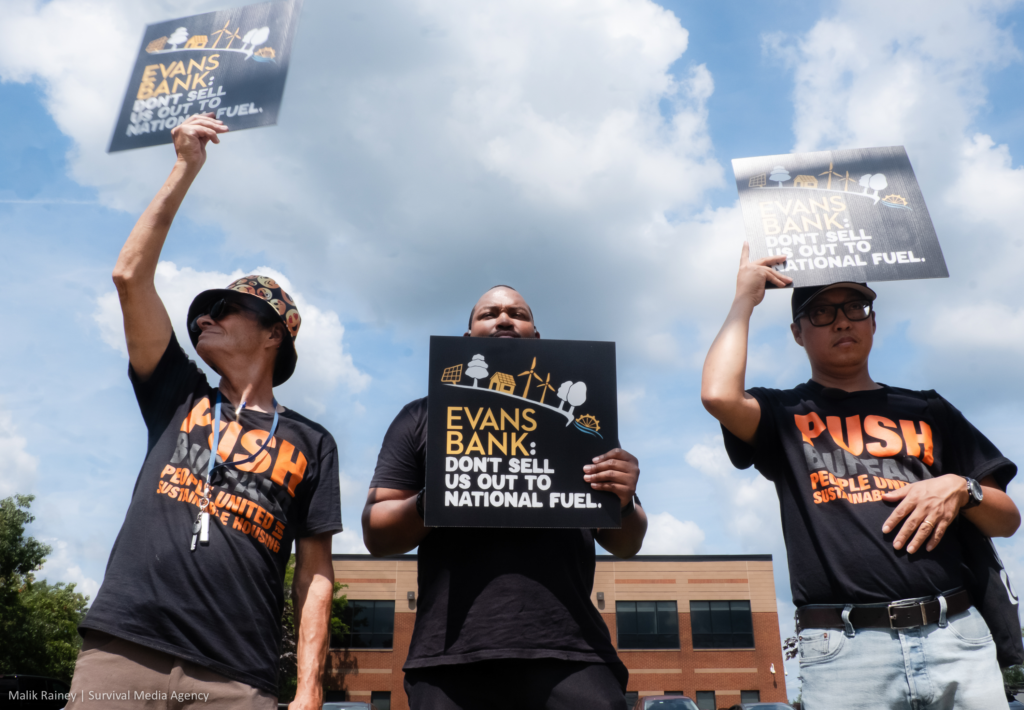This August 2024, local and state groups across People’s Action Institute and 350 Network Council organized 31 actions in 19 states to demand: Energy systems run by and for the people — democratic ownership and decision-making for energy generation & distribution; reliable and affordable energy for all; transition to 100% clean renewable energy.
You can find a full list of actions here.
Everyone deserves access to clean, affordable energy.
Fossil fuel utilities are blocking the transition to clean renewable energy and ruthlessly profiting off of the American people, 27% of whom cannot pay their energy bills. Monopoly utility companies hike up their rates while spending their money on energy sources that are unreliable, expensive, and burning up the planet.
Utilities must accelerate the transition to renewable energy and ensure energy access as a human right. By building a shared public narrative against investor-owned monopoly utilities and taking away the financial and political support these companies enjoy, we can make way for an energy system where decisions are made in the best interests of people and our planet, rather than the fossil fuel industry and corporate shareholders.
Lessons Learned:
This issue of utility justice is widely and deeply felt. Across the nation, immigrant communities, working families and seniors on fixed incomes face both an affordability and climate crisis. New groups, individuals, and electeds were reaching out to organizers to participate in these actions; it was like putting out a bat signal and folks responded.
There are trends and opponents that unify the fight against for-profit utility companies, although our energy system is fragmented, regional and state-specific. Across the country, utilities are raising rates and doubling down on fossil gas to meet rising demand for electricity. Whether in red, purple or blue states, for-profit utilities are blocking clean energy laws and charging ratepayers to build new expensive fossil fuel pipelines and plants even though renewables are now affordable, reliable, and popular. For example, National Grid in New York is putting ratepayers on the hook for $5 billion to update gas infrastructure. In Nevada, monopoly corporation NV Energy – owned by billionaire Warren Buffet – is attempting to triple Nevadans’ monthly service charge while building a new gas plant, even as Vegas suffered seven days straight of 115-degree heat this summer.
Many regulators and utility companies are not used to public pressure – and it shows. Targets nervously responded to direct action. PUSH Buffalo organized a bus tour calling out local institutions (Tops Markets, Evans Bank, Independent Health, the Niagara Frontier Transportation Authority) for backing National Fuel and killing the NY HEAT Act, a statewide bill to reign in gas utilities. Tops and NFTA responded defensively to reporters. Elsewhere in NY, Long Island dispatched 11 cop cars to meet five protestors outside National Grid headquarters.
Pairing inside game and outside pressure is necessary. Utility advocacy has historically been dominated by a highly technical approach, with an emphasis on legal and policy leverage. These capacities are important and also have their limits. Robust grassroots movements and outside pressure are necessary to create the political will to move decision makers, whether that is regulators, electeds, or the companies themselves. Change is possible when we apply multiple sources of leverage, combining the best of legal, policy, media, and public pressure.
A unifying narrative that connects the dots between planet and pocketbook is useful. Utility justice is a critical opportunity to unite the fights for economic, racial and climate justice and to bring new supporters into our movement. For example, West Virginia radio station WCHS reported, “West Virginians for Energy Freedom…came together for a ‘Bills Too High Rally’ in front of the AEP Office in Charleston…to address the increasing power bills. However, the event was not only a way to address their concerns of the rising energy costs, but advocate for locally-owned and renewable energy solutions.”
Organizing gets the goods! On the eve of the West Virginia action, AEP announced it would suspend the rate hike for at least another eight months. 350 Wisconsin brought the public into the Public Service Commission’s (PSC) regulatory process as an intervenor and their creative advocacy was cited as a key factor in saving net metering. 350NH ran a multiyear campaign that forced Liberty Utilities to abandon a massive fracked gas expansion plan.
Next Steps:
Register at this link to join a call on Tuesday 9/24, 1-2:30pm PT / 3-4:30pm ET to (1) workshop a specific campaign, (2) share lessons and challenges, (3) share resources for utility justice campaigns, such as organizing raps, tips to engage your Public Utilities/Service Commission, ideas for state legislative sessions.
###
People’s Action Institute is a national network of member-led, power-building organizations with more than a million members and tens of thousands of national volunteers. We are from every background, speak many languages, and live in small towns, cities and rural areas. We are all of us! Learn more about our work at peoplesactioninstitute.org.
Care Over Cost is a national grassroots campaign founded by People’s Action Institute and supported by 25 state and national organizations working to address the problem of health insurers stopping people from getting the treatment they need or refusing to pay for treatments people have already received. www.careovercost.org
